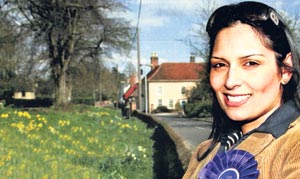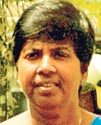The traditional sweet shop, with its jars of humbugs and jelly beans, nestles under the clock tower in the market town of Coggeshall, Essex. “What’s popular?” asks the thirty something mother who has wandered in off the street. “Sherbets and rhubarb’ n’ custards,” says the owner.
“They’ll never go out of fashion,” laughs Priti Patel, the mother. “I’m the daughter of a sweet-shop owner,” she continues. “I grew up in one. My parents came here from Uganda and have run corner shops all over the southeast. There’ll always be a demand for sweets… where’s your cash-and-carry?”
 |
| Priti Patel on the stump in Coggeshall, Essex. She is one of the women candidates hellbent on reshaping the Tory party |
It is perhaps not the kind of chat that leafy commuter-belt Essex expects from its future Tory MP. If she gets in – pretty likely! the new constituency of Witham, a largely rural bit of north Essex, is seen as a safe seat – Patel will be Britain’s first female Asian Tory MP.
Her local party loves her. For our walk about on a sunny afternoon there are more constituency stalwarts in our gaggle than voters on the street. Rodney (all alarming tweed-checked trousers, gold-buttoned blazer and plummy tones) tells me how he took Patel down to the coast one night to meet the party faithful.
“One of the ladies got a bit tiddly and said, ‘How are you going to go down in Tollesbury with a name like Patel?' ” he recalls. “Priti cracked back, ‘Actually, there are more Patels than Smiths in the local phone book.’ Touche! Priti’s got robust views and robust energy. She’s one of us!”
Indeed she is. Striding through the daffodils and blossom in her leopard-print flats, Patel looks the very mode of a Cameronian new Tory. And she is representative of a new generation of female candidates standing in this election who are hell-bent on remaking the party.
It's not that she wants to deny its past. "I'm like a stick of Tory rock," says Patel. "Cut me in half and I'm true blue all the way." Margaret Thatcher was her heroine as a child and she believes in "pulling yourself up by your bootstraps, that the essence of Conservatism is aspiration".
By trade Patel is a corporate spin doctor, advising such blue-chip firms as Microsoft. In an earlier incarnation she was press officer for William Hague, the former Tory leader, in the 2001 election campaign. "Exhausting" is how she describes that. "It's much more fun being out in the daylight. I never would have stood if they hadn't changed the Westminster hours: they were death to family life."
Patel has an 18-month-old son, Freddie, who is staying with her mother-in-law and her husband for the campaign. "I want to focus, properly. He'll be more settled with his granny," she says.
She is one of 145 women who are standing for the Tories, many of whom have been supported by the party's Women 2 win campaign, a group that encourages women from all walks of life to stand for parliament and mentors them through the selection process. David Cameron has made much of the changes he has wrought to his party, boasting of trebling the number of female Tory MPs if he wins power. That's all very well, but it will be trebled from an amazingly low base - at present there are only 18 female Conservative MPs; he hopes to have at least 60 after May 6. By comparison, in 1997, 101 so called Blair Babes were elected to parliament in the new Labour landslide.
"The new Tory women will be different," argues Patel. "We will have got there on merit. We aren't the result of women-only shortlists, we were chosen because we were the best. We won't just be lobby fodder. Many of the women who got in 1997 were never meant to be there, no one ever thought they'd win." There is some truth to that and, having spent last week shadowing Tory women candidates, I can report that Cameron's claim to have changed his party is not just spin. The Tories I met were not scary Europhobe members of the blue-rinse brigade (although a few of their supporters were) but reasonable, moderate, modern types.
The statistics suggest my experience wasn't just luck: analysis of the candidate list by The Sunday Times shows that only 7% of the prospective Tory women MPs are career politicians, only a third went to private school and 29% went to Oxbridge.
The new women include Kemi Adegoke, 30 who fled Nigeria at 16 and "flipped burgers and cleaned toilets" before studying engineering at Sussex University; Louise Bagshawe, a bestselling novelist; and Nusrat Ghani, 37, a Goldman Sachs banker, who was born in Kashmir and responded to Cameron’s appeal for women to stand for the Tories last summer.
"I am the daughter of immigrants and the first woman in my family to go to college and university," says Ghani. "Coming from such a background taught me the importance of education, aspiration and the work ethic to deliver the opportunity and social mobility to succeed."
Another candidate hoping to take advantage of this shift is Mary Macleod, who is standing in the west London seat of Brentford and Isleworth. A cheerful forty something blonde, Macleod, who was brought up in the Highlands, a daughter of the manse, worked for the consultants Accenture before setting up her own management consultancy.
What really drives her is attracting more women to the Tory cause. "I am passionate about recruiting more women into politics," she says. "When I worked for Accenture there were three women (members of staff) to 30 men. We just worked through it, but things have changed; now it is more like 50:50. A similar change has to come to parliament. But the process has to be meritocratic, it doesn't help women if they are only there because of quotas."
Courtesy the London Sunday Times
Local scene: Women’s ticket to Parliament still through male connection
By Chandani Kirinde
While worldwide women’s representation in Legislatures is increasing and the stature of women entering these bodies is growing, Sri Lanka continues to lag behind despite its boast of having had the world’s first woman Prime Minister, Sirimavo Bandaranaike.
 |
 |
 |
 |
| Sumedha Jayasena |
Sudharshini Fernandopulle |
Pavithra
Wanniarachchi |
Talata
Atukorala |
Between her and daughter Chandrika Kumaratunga who became Executive President in 1994, they ruled the country for 22 years but the role of women legislators in the country has failed to evolve in the same manner as Sri Lankan women in other spheres of society have done such as in the corporate sector, the state sector or the legal field where women have made significant inroads into male dominated abodes.
While the number of women who were elected to successive Parliaments since the country’s first election in 1947 has been small, even more disheartening is the fact that most women handpicked by the political parties are rarely nominated on merit but mainly because they win favour with the leadership of the parties they represent. In the majority of cases, a deceased husband, father or brother who was engaged in politics has become a sure way to win a party ticket to contest the polls and enter Parliament.
This is a trend that is not peculiar to Sri Lanka alone but one that plagues the whole of South Asia with prominent women politicians emerging from behind the shadows of either a politically powerful father or husband. But it is a trend that needs to be checked if women in politics are to make any real contribution as elected representatives.
In the 2010 general elections, 10 women were elected to Parliament while three were nominated from the National List, a paltry total of 13 in a legislature of 225 MPs.
Three of these women donned the political mantle after their husbands were assassinated (Sumedha Jayasena, Sudharshini Fernandopulle, and Vijayakala Maheswaran), three followed in the footsteps of their fathers (Pavithra Wanniarachchi, Nirupama Rajapaksa and Chandrani Bandara) and one took the place of her dead brother (Talata Atukorala).While these women have every right to pursue a political career, the question that arises is would they have got their party nominations if it was a merit- based system? The answer would most probably be no.
While the numbers itself tell a sorry tale, it is the lack of involvement in the affairs of parliamentary business by women legislators that is more disturbing. Both inside the House as well in Parliamentary committees, the participation of women MPs is minimal. In the previous Parliament, their inclusion in important committees was nil while in debates of national importance, they were hardly ever heard. It has reached a point now where women legislators think they should only speak on women’s affairs and nothing else.
They remain quiet while their male colleagues argue it out on issues raging from the cost of living to waste and corruption, heath and education or international affairs. Sadly their decision to sit pretty and not take on issues on which a woman may well have a better perspective does little justice to the thousands of other women in Sri Lanka who don’t have the opportunity to speak up at such a forum but have made giant strides, working their way up in their respective fields.
While merit is not a criteria for either men or women to enter the political arena in this country, the least they could do once elected is to raise a powerful voice on behalf of the voters who put them there.
Priti sitting pretty
Voters in Witham made history by sending the first female Conservative Asian MP to parliament. Priti Patel will represent the newly formed constituency after taking 24,448 votes.
The Liberal Democrats took second place, with Margaret Phelps receiving 9,252 votes, followed by Labour man John Spademan with 8,656.
Mrs Patel, who was hotly tipped to take the seat, considered to be a Tory stronghold, said: "I would like to thank all the candidates, it has been a tremendous campaign.”
Courtesy thisistotalessex.co.uk |
